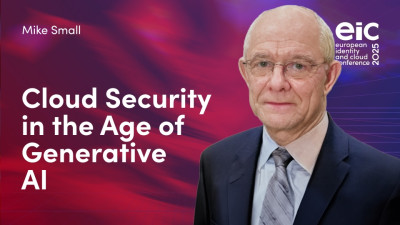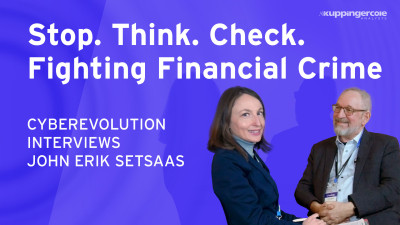Thank you. Yeah.
So again, I will, and really I'm talking about this. My perspective is as a human, not really as a identity or cryptography researcher, I think it's important to think about the human implications of the staff.
So yeah, I gotta talk about how, how did SSI come about just briefly, you know, what can it do, what's it for, and then looking at anticipating the uncertain future and what are the implications of that? Particularly some questions that maybe we should be thinking about, or I really want to just get people to think outside, maybe the SSI decentralized identity technology and wider.
Yeah. So we've all seen this before.
I'm sure some of the variation of it, and, and I'm trying to emphasize here that that digital identity or SSI, you know, came from digital identity solutions, you know, how do, how do we make it easier to identify people in the digital world? How do we authenticate them? And really self-sovereign is a response almost to the federated systems, which, you know, has created all these unintended consequences, almost, you know, the surveillance systems that we kind of all exist under. Yeah.
So just to remember, you know, SSI is a technical solution for identification authentication and authorization in digital systems.
And then at the same time, SSI has enabled this thing called a verifiable credential. And if you think about the history of credential, you know, where did credentials come from? Probably some of the earliest cases is physicians.
And, you know, Dr. Manja is doing a fantastic job in, you know, trying to solve that problem, cuz physicians have this huge burden, but credentials also, you know, we used to live in a world where probably credentials were very rare. Not many people had credentials, it just went about their daily lives and gradually we've had more and more credentials being pushed into our lives.
And that's not necessarily a bad thing, but you know, there are cases in the past sort, you know, thinking about this sort of papers, please, you know, the state and the fact that, you know, they're checking your credentials, that's become more prevalent.
And now we have travel sort of a passport, you know, and, and a passport is not, I don't think it's bad, but you have to think about the implications of that, you know, by having an English passport or a British passport, you potentially have more influence and power than someone who has a passport from a less known or less trusted country based on the perception of the person doing that verification.
Yeah. And obviously there's age, there's lots of different types of credentials. And then we have these account credentials, which is really different, right?
It wasn't really a good, it wasn't quite a credential. It was me authenticating to this digital system.
And, and I think to think about that, that a credential is, is a, is a mechanism for which can be used to define rules against and constrain possibilities, you know, to limit who can do certain things based on the possession or not possession of this credential. That is essentially what they've been used for, you know, does, is this doctor qualified? Do you have a passport enable you to travel or not? And if you don't, then you can't do this, this thing.
So when we're thinking about SSI and this ability to issue credentials and have verifiers who want to verify them, what types of international interactions could we constrain and limit and, and what types of interactions should we constrain?
I think is an interesting one to think through.
So for me, like individual to machine, I think that's a valid use case and really where this originated from. Like, I want to be able to identify to the systems that digital systems, but there are other use cases which are maybe less sure of, and maybe we should be more careful about bringing, you know, because credentials into this interaction. So like individual to individuals, shouldn't be verifying credentials in these situations, even individual to organization. I think there's definitely a case as with a doctor who is performing a role within an organization to have credentials.
But what about when I'm an individual interacting with an organization without being a member of that organization?
I'm just trying to put forward the different types of, of use cases that we should be thinking about when applying these credentials. And at the same time, you know, what we have today is a digital systems and human systems, you know, our social systems, our lives, and before, at least until recently digital systems were part of human systems, but they didn't influence it too much.
And, you know, increasingly see these like surveillance systems, these digital systems are starting to have real world impact on human, on humans and how they go about their lives. And do we want digital systems, human systems to become more digital, more precise, more rigid, or do we want them to become more digital systems to become more human? And how do we manage that balance between these two systems and how they impact each other and how they evolve together?
So probably sort of introduced this a little bit better, but I recently went to a workshop which kind of really stuck with me.
And it's about foresight, future studies from this, this lady, Wendy Schutze excellent. I definitely recommend reading the paper. It's about thinking, what are the first or, you know, if SSI gets widely adopted, what are the first order, second order, and third order impacts of, of this technology.
And, and this here is really just to get people thinking it's not a, you know, something that should be done together with people who have different perspectives and ideas about where the future might be going. This is just me putting some ideas out there. I think it's to encourage us to think about what futures do we want to incentivize and how do we, you know, we we're gonna come across some challenges in the future.
You know, not thinking about five years, but what about 10 years, 20 years, 30 years, how do the technologies that we are producing?
How are they impacted by the emerging challenges that we're gonna be facing, but gonna cause our values, our, our modes of doing things to shift and how does the possibilities that we enable by the technologies that we are pushing out into the world, get impacted by this changing values and changing needs of our society. You know, what about the massive inequality in the world?
Who's gonna be able to leverage this technology for their benefit, who are gonna be the winners and, and who are gonna be the losers and, and what this manner, you know, this scenario building encourages us to do is to think about some of these changes, think about their impacts and build them out, but then also think about, okay, how do these impacts impact each other? You know, how do they collide? What are the links between these two things and, and where of futures we might want to really work hard to avoid.
And I think that's really important, you know, say we get to 2050 and SSI has been widely adopted 2050, without a doubt, we are gonna be going through some catastrophic, catastrophic impacts of climate change. You know?
So, so what are the impacts of that with people being able to issue these verifiable credentials are, are they impacts that we can predict and, and are the impacts that we want.
So to be clear, I, I believe SSI is, is a powerful technology and I'm, I'm an advocate for it, but I, I feel like that we need to step outside almost sometimes this, this technology and, and, and at least anticipate how it might be used based on the changes that, that we must know are coming.
So I have a few questions just to, just to really stimulate some thought, that's all I'm trying to do here.
I, I'm not criticizing anyone. I think everybody in this space does a, does a great job, but yeah, so this is a big one for me. So you can think of what it was, the impact of SSI going widely adopted. Clearly it is the ability to issue and verify credentials is much easier, right? It's cheaper is faster, but does that mean that all, you know, the majority of our interactions become based on this exchange of credentials, you know, the exchange of proof before we can start to communicate and interact as human beings.
And, and this one is, I think it's important to think about, right? We in digital systems, you, you have a yes or a no answer, you know, does this credential verify, does it meet the criteria that I'm stating, do we wanna make it impossible? Are we gonna create a system where the rules are impossible to break and, and do we want that system?
And, and at the same time, we're asking that it's important to think who who's gonna be making these rules, you know, in this future, they're all all going to, who is gonna be empowered to make the rules. How are the people who are living under those rules gonna be able to challenge the rules that are, that they are living under and, and how are they gonna change? How is this system?
We, we gonna create gonna evolve to meet the challenges that, that we need to face together. And I think for me, this is a big one, you know, as a credential holder, what power do I have in, in an identity system? Is it merely to be the carrier of information from an issuer to a verifier for the purposes defined by the business use case of those organizations?
You know, or do I have some rights as an, as a credential holder to, you know, make statements as that whole kind of challenge, the rules that I'm living under? You know, what, what things can we build around the individual to allow their capabilities to really be, be powerful in these systems?
And, and similarly, you know, we talk about all this great technology and, and I'm, I'm all for it. It is great, but, but you know, in a world where we have this massive inequality who is gonna be able to benefit from these systems who, how, what tools do we need to build and education, do we need to champion to make sure that everybody is able to interact truly as peers and not just being controlled by the credentials that they need to possess to do certain things.
And, and I think this is important, cuz we talk about SSI as, you know, self sovereign let's make the individual more powerful in these systems. But I think it's to, to challenge that could, could this could SSI actually reduce human autonomy in agency, in these systems?
I think, I guess what I'm trying to say is SSI is a technology is it's up to us as, as humans to influence and decide how we want to apply that and the futures that we want to make possible and, and make sure we are not limiting ourselves to a more digital world that is constrained.
And finally, this last one is something that I've been thinking about recently is, you know, self-sovereign identity is about the sovereign individual.
And I think our Western world is very much about individualism, but is that the right model to really help us come together and tackle some of these lot, these big problems in the future? You know, can we really model the individual individually? Do they have to be modeled taking into account the wider system that they're part of?
So, I mean, that's all for me. I, I, I think it's really just a, can we think more longterm about our future and how does that impact the decisions that we should be taking today based on the technology and the capabilities that we know are possible with it, to help us be, create more resilience in these systems and create more resilience for everyone and make sure that in the future, we don't end up looking back and going down.
I wish I, I wish I hadn't been involved in making this possible. You know, how, how do we anticipate that? And then work backwards and think, okay, you know, if we really wanna avoid these situations, let's start making sure we are doing X, Y, and Z.
So yeah, that's, that's all for me. I, it is not really my area, I guess, but it's as a human it's, all of our areas, you know, we, we, we're all within this world, we all can see that this world is changing and, and the technology will be used in ways we can't anticipate and maybe will be used in ways that, that aren't all rosy and good. So thanks for.


















































